Media and Journalism
-
 Government
GovernmentCalifornia AG Says Journalist Broke The Law By Obtaining A List Of Convicted Officers Via A Public Records Request
The AG stepping in to tell journalists they can't have a document they already have is the wrong kind of audacious. -
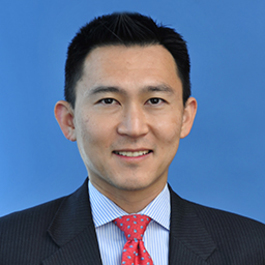 Non-Sequiturs
Non-SequitursNon Sequiturs: 02.03.19
* How have personnel changes at the Supreme Court affected the dynamics at oral argument? Adam Feldman offers this analysis. [Empirical SCOTUS]
* Ed Whelan expresses relief over the White House’s new slate of Ninth Circuit nominations. [Bench Memos / National Review]
* Can President Trump declare a “national emergency” in order to build his beloved wall? The National Emergencies Act is not a blank check, according to Brianne Gorod. [Take Care]
* Should Congress pass a “deepfakes” law? Orin Kerr has some concerns. [Volokh Conspiracy / Reason]
* What’s going on with Rudy Giuliani? Joel Cohen has a theory. [The Hill]
* Jean O’Grady is pleased to see all the competition in the legal analytics space (with Precedent Analytics from Thomson Reuters as the newest entrant) — but she’d like to see more support for the competing claims of the different products. [Dewey B Strategic]
* News organizations need stricter and better guidelines when interviewing mentally ill defendants, according to former public defender Stephen Cooper. [The Tennessean]
* Have questions about the fast-approaching February bar exam? Ashley Heidemann has answers. [JD Advising]
 Sponsored
SponsoredEarly Adopters Of Legal AI Gaining Competitive Edge In Marketplace
How to best leverage generative AI as an early adopter with ethical use.-
 Non-Sequiturs
Non-SequitursNon Sequiturs: 12.23.18
* Nancy Gertner and Laurence Tribe take Alan Dershowitz to task for his unorthodox analysis of the sentencing proceedings of General Michael Flynn. [Boston Globe]
* In this elegant essay, Jane Chong uses two notable new books — To End a Presidency: The Power of Impeachment, by Laurence Tribe and Joshua Matz, and the updated edition of Charles Black’s classic, Impeachment: A Handbook, with a new preface and additional chapters by by Philip Bobbitt (affiliate links) — as the jumping-off point for reflections on impeachment, law, and politics. [Los Angeles Review of Books]
* Judges often struggle when it comes to sentencing — and that’s as it should be, according to veteran defense lawyer and former prosecutor Joel Cohen. [New York Law Journal]
* Yes, more of President Donald Trump’s judicial nominees have been rated “not qualified” by the American Bar Association compared to the nominees of his four most-recent predecessors — but as Patrick Gregory explains, there are some reasons for this (most notably, the Trump Administration’s decision to stop giving the ABA a sneak peek at nominees, which allowed past administrations to simply pull nominees the ABA deemed unqualified). [Big Law Business]
* Jonathan Adler has many problems with the recent ruling by Judge Reed O’Connor (N.D. Tex.) on the constitutionality of the Affordable Care Act — including the fact that Judge O’Connor ruled in the first place. [Volokh Conspiracy / Reason]
* Former public defender Stephen Cooper flags an issue that many reporters probably haven’t thought much about: “When Will Journalism Grapple With the Ethics of Interviewing Mentally Ill Arrestees?” [CounterPunch]
* As 2018 draws to a close, the U.S. Chamber offers up its annual list of the year’s Top 10 Most Ridiculous Lawsuits.
[Faces of Lawsuit Abuse]* Looking ahead to 2019, the new year could ring in new legislation that could help lower drug prices by facilitating the timely entry of generics into the market, as Alaric DeArment reports. [MedCity News]
-
 In-House Counsel
In-House CounselWhat Trump Said About Law Firm Bonuses!
Interesting commentary on bonus season from POTUS. -
 Non-Sequiturs
Non-SequitursNon Sequiturs: 11.04.18
* A fun bit of trivia (via Adam Feldman): which Supreme Court justice cites law review articles most often? (Hint: he does so a lot in dissent.) [Empirical SCOTUS]
* Charles Glasser argues that Senator Claire McCaskill — who’s in a tough reelection fight against a former SCOTUS clerk, Josh Hawley — advocates a move that “represents a clear and present danger to investigative journalism.” [Daily Caller]
* It’s helpful to Josh Hawley that President Donald Trump is so popular in Missouri — even among women, interestingly enough. [Althouse]
* Immigration law is a hot topic these days, thanks in large part to President Trump — so it makes sense that Fastcase and the American Immigration Lawyers Association (AILA) are launching a new law journal focused on this interesting and complex area of law. [Dewey B Strategic]
* Speaking of immigration, Ilya Somin refutes the argument that migrants should just stay home and “fix their own countries.” [Volokh Conspiracy / Reason]
* Who says bankruptcy lawyers and judges don’t know how to have a good time? [Texas Bankruptcy Lawyer’s Blog]
-
 Non-Sequiturs
Non-SequitursNon-Sequiturs: 09.16.18
* Will Senator Susan Collins be persuaded by the campaign to get her to vote against Judge Brett Kavanaugh? Ed Whelan has his doubts. [Bench Memos / National Review]
* Speaking of the Supreme Court, Adam Feldman identifies his “Supreme Court All-Stars” (2013-2017): the lawyers and law firms with the most arguments — and wins — before the high court. [Empirical SCOTUS]
* Greg Lukianoff and Adam Goldstein offer tips for protecting freedom of speech on college campuses, inspired by a new book, The Coddling of the American Mind (affiliate link) by Greg Lukianoff and Jonathan Haidt. [Volokh Conspiracy / Reason]
* Charles Glasser to news organizations, on the subject of self-policing: do better. [Daily Caller]
* How should we evaluate the success of law firm mergers? Madhav Srinivasan of Hunton Andrews Kurth has some thoughts on methodology. [Law.com]
* And Orin Kerr offers a proposal for applying the Fifth Amendment privilege against self-incrimination to compelled “decryption” of a locked phone, computer, or file. [SSRN]
* Speaking of privacy, Google is taking some heat in Arizona over its alleged practice of recording location data of Android device owners even if they opted out of such tracking. [Washington Post]
* When it comes to learning how to integrate technology into the delivery of legal services, American law firms can learn a thing or two from the Brits — as the latest move by CMS suggests. [Artificial Lawyer]
-

-

 Sponsored
SponsoredLegal AI: 3 Steps Law Firms Should Take Now
If 2023 introduced legal professionals to generative AI, then 2024 will be when law firms start adapting to utilize it. Things are moving fast, so…-

-
 Morning Docket
Morning DocketMorning Docket: 08.17.18
* In response to President Trump’s “relentless assault” against the press, more than 300 newspapers published editorials denouncing his attacks and defending the freedom of the press. In response, Trump said he wants “true” freedom of the press, but without the “FAKE NEWS.” Come on, even the Supreme Court wants the press to remain free. [National Law Journal]
* Gallery Books and Simon & Schuster, the publishers of Omarosa Manigault Newman’s White House memoir, are hitting back hard against President Trump’s attempts to silence her and stop its publication. this letter from Davis Wright Tremaine partner Elizabeth McNamara is freakin’ fantastic. [Deadline]
* According to prosecutors, an argument over family financial matters is allegedly what caused John Gately III to fatally shoot his brother-in-law, Mayer Brown partner Stephen Shapiro. The Supreme Court star reportedly died in an attempt to protect his wife. Gately has been denied bond and plans to plead not guilty. [American Lawyer]
* ICYMI, two judges were just confirmed to the Fourth Circuit by margins we haven’t seen in a while. Meet Julius Richardson, a federal prosecutor who once worked at Kellogg Huber (81-8), and Judge Marvin Quattlebaum, a former Nelson Mullins partner who’s been a a federal judge for six months (62-28). [Courthouse News]
* Law firm merger mania: Stinson Leonard Street will be merging with IP boutique Senniger Powers to add some extra oomph to the firm’s “market-leading IP services.” The merger is expected to close on October 1, bringing Stinson Leonard’s total headcount to almost 500 attorneys. [St. Louis Post-Dispatch]
* Trinity Western University wants to open a law school so badly that the administration is now willing to drop the “community covenant” that would have forbidden gay students from having sex. That rule will now be optional for the student body at the Christian school. Would you want to enroll? [StarMetro Vancouver]
-
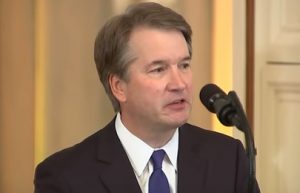 Non-Sequiturs
Non-SequitursNon-Sequiturs: 07.29.18
* Amy Howe has highlights from Judge Brett Kavanaugh’s completed questionnaire for the Senate Judiciary Committee — including the five different law firms where he worked as a summer associate. [SCOTUSblog]
* Despite Judge Kavanaugh’s impeccable qualifications, the battle to confirm him to the Supreme Court will be hard-fought — and Adam Feldman explains why. [Empirical SCOTUS]
* In other nominations news, Veronica “Ronnye” Stidvent, a prominent Latina lawyer, comes to the defense of Ryan Bounds, whose Ninth Circuit nomination was defeated last week. [Oregonian]
* Does the failure of the Bounds nomination spell trouble for the Kavanaugh nomination? Here are some thoughts from Elizabeth Slattery and me. [SCOTUS 101 / Heritage Foundation]
* Had he been confirmed, Ryan Bounds would have replaced his (and my) former boss, Judge Diarmuid F. O’Scannlain — who just penned a landmark Second Amendment opinion, Young v. Hawaii, that could very well wind up before SCOTUS (and allow the Court to settle a circuit spit). [Volokh Conspiracy / Reason]
* Speaking of the Ninth Circuit, Chris Walker has some concerns about the late Judge Stephen Reinhardt casting the deciding vote in an important tax law case, some four months after his passing. [Notice & Comment / Yale Journal on Regulation]
* Why is the internet such a cesspool today? Media lawyer Charles Glasser identifies five factors behind the decline (and gives a shoutout to Above the Law’s dearly departed comments section). [Daily Caller]
* Elsewhere in the First Amendment world, Joel Cohen and Dale Degenshein argue that it should be easier for parties to have documents sealed in litigation. [The Hill]
* If you appreciate the dying art that is the book review, check out Alice Lloyd’s beautifully written review of Robert Anthony Siegel’s Criminals: My Family’s Life on Both Sides of the Law (affiliate link), which paints a portrait of his father, Stanley Siegel — “a big-hearted and brilliant,” but deeply troubled criminal defense lawyer. [Weekly Standard]
-
 Non-Sequiturs
Non-SequitursNon-Sequiturs: 07.01.18
* Having placed Justice Anthony Kennedy’s Supreme Court retirement in political context, let’s now put it into historical context. [Retropolis / Washington Post]
* This makes some folks quite upset, but there’s no denying it: the Roberts Court is now truly the Roberts Court (and he probably isn’t thrilled about it either). [Empirical SCOTUS]
* Kathryn Haun — a former Kennedy clerk, by the way — has parlayed her expertise in Bitcoin, developed during her years as a federal prosecutor, into a new position leading Andreessen Horowitz’s $300 million fund focusing on cryptocurrency-related startups. Congrats, Katie! [Axios]
* Let’s not forget about President Trump’s transformation of the lower federal courts — because it’s not just about SCOTUS. [The Takeaway / WNYC]
* Check out Susman Godfrey’s new mandatory retirement policy — could this become the industry standard? [Texas Lawyer]
* Yes, the First Amendment is awesome and all — but is it also encouraging errors in news reporting, as Charles Glasser suggests? [Daily Caller]
* Speaking of mistakes, Ed Whelan sets Ben Shapiro straight on Judge Brett Kavanaugh, a leading contender to replace Justice Kennedy. [Bench Memos / National Review]
* President Trump says he wants to pick a SCOTUS nominee who could serve on the Court for 40 years or more — and if you take the five youngest names on his list of 25, it’s entirely possible. [Althouse]
* This should come as no surprise, but now law firms are joining the chase after data scientists. [Artificial Lawyer]
* Congratulations to the Practising Law Institute (PLI) and Fastcase, innovators in their respective spaces, on their new alliance. [Dewey B Strategic]
-
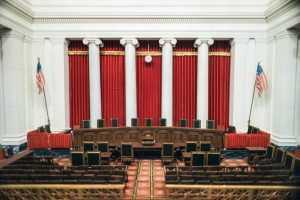 Non-Sequiturs
Non-SequitursNon-Sequiturs: 06.24.18
* It’s checkout time at the Supreme Court, and courtroom correspondent Mark Walsh is ready to reveal what’s in his shopping cart. [SCOTUSblog]
* Being cited by the Supreme Court is usually something to boast about — but not always, as Adam Feldman notes in this thoughtful analysis of how much oral arguments matter. [Empirical SCOTUS]
* Will Baude breaks down the Court’s intriguing debate over stare decisis in South Dakota v. Wayfair. [PrawfsBlawg]
* Joel Cohen looks at why the federal judiciary gets better treatment from the press than the other two branches of government — and whether the differential is justified. [The Hill]
* Orin Kerr identifies an interesting issue: if a police officer uses Google Translate to try and request consent to search from a non-English speaker in that person’s own language, is the consent valid if Google Translate botched the translation? [Volokh Conspiracy / Reason]
* There’s a long and bipartisan tradition of… the federal government spying on reporters, as Charles Glasser explains. [Daily Caller]
* Speaking of the media, Jean O’Grady points out a helpful new resource from CQ for consumers of news, along with tips for how to tell whether or not a story is “fake news.” [Dewey B Strategic]
* If reforms come to university boardrooms, let’s hope they include law schools as well. [ProfessorBainbridge via Instapundit]
* An interesting new use of voice-activated technology, courtesy of Wolters Kluwer: getting insights into federal tax law. [Artificial Lawyer]
* If you’ll be in New York on Tuesday, July 17, raise your glass with fellow young lawyers, summer associates, and law students, at the UJA’s Summer Law Happy Hour. [UJA Federation of New York]
Sponsored

The Business Case For AI At Your Law Firm


Legal AI: 3 Steps Law Firms Should Take Now

Navigating Financial Success by Avoiding Common Pitfalls and Maximizing Firm Performance
Sponsored

Is The Future Of Law Distributed? Lessons From The Tech Adoption Curve

Early Adopters Of Legal AI Gaining Competitive Edge In Marketplace
-
 Litigators
LitigatorsA Healthy Media Diet For A Litigator: How You Spend Your Free Time Can Make You A Smarter, Better Litigator
With a little willpower, you can make a big improvement over time. -
 Books, Justice, Politics
Books, Justice, PoliticsTailspin: An Interview With Steven Brill, American Lawyer Founder Turned Bestselling Author
The lawyer turned media mogul diagnoses the nation's ills in his latest book. -
 Courts, Government
Courts, GovernmentJudicial Nominees And Their College Writings: Enough Is Enough
We need a statute of limitations when it comes to the scribblings of one's youth. -
 Non-Sequiturs
Non-SequitursNon-Sequiturs: 03.25.18
* Brad Karp and Christopher Boehning of Paul, Weiss make the case in favor of stripping gun manufacturers and sellers of their statutory immunity from suit in most negligence and product liability actions. [New York Times]
* Remember the Moonlight Fire case? Ten state AGs have filed an amicus brief in support of the cert petition. [U.S. Supreme Court]
* It’s almost time to file your taxes — and the Supreme Court just made it a little bit easier to cheat on them. [Volokh Conspiracy / Reason]
* In other SCOTUS news, the Court is taking its sweet time in handing down opinions this Term, as Adam Feldman observes. [Empirical SCOTUS]
* And speaking of Adam Feldman, he’s now working with SCOTUSblog — congratulations to both parties! [SCOTUSblog]
* Leading media lawyer Charles Glasser looks at the challenges that corrections pose to the media (both print and digital). [Daily Caller]
* Vineeta Vijayaraghavan points out that gun violence doesn’t spare the elite, noting that firearms killed three of her Harvard classmates (including Professor Dan Markel). [USA Today]
* Cambridge Analytica, a data analytics consulting firm, has been widely condemned for its work on the 2016 Trump election campaign — but it’s not clear that its conduct violated data-protection laws or even Facebook policies, according to Tim Pullan of ThoughtRiver. [Artificial Lawyer]
* Professor Michael Dorf remembers lawyer, author, and editor Julie Hilden, who passed away earlier this month. [Dorf on Law]
-
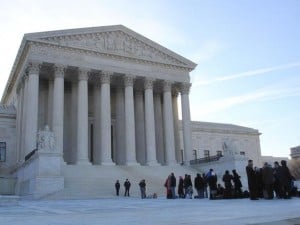 Non-Sequiturs
Non-SequitursNon-Sequiturs: 03.18.18
* Adam Feldman uses BriefCatch, a powerful new tool from legal writing guru Ross Guberman, to find the best writers in the Supreme Court bar — and some of the top advocates might surprise you. [Empirical SCOTUS]
* Prominent First Amendment litigator Charles Glasser makes the (compelling) case in favor of a federal anti-SLAPP statute. [Daily Caller]
* Jeff Hauser, executive director of the Revolving Door Project, argues that the Trump Justice Department’s installation of Trump allies as interim U.S. attorneys “represent[s] a test of civil society’s ability to fight back against threats to the rule of law” — and so far, “the test is going poorly.” [Slate]
* Speaking of the Trump DOJ, Ben Adlin breaks down the latest federal-state fight — and explains why it’s not as simple as just citing the Supremacy Clause. [Leafly]
* “Bring me a case!” Reflections from Joel Cohen and Bennett L. Gershman on using litigation to bring about social change. [Law.com]
* What can legal marketers learn from… a man using a cat as his hat? [Shana Douglas]
-
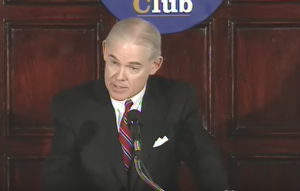 Non-Sequiturs
Non-SequitursNon-Sequiturs: 03.11.18
* This great profile of Chuck Cooper, by Tierney Sneed of TPM, includes more details on why he withdrew from the solicitor general sweepstakes. [Talking Points Memo]
* A team from Quinn Emanuel, led by high-profile hire Alex Spiro, is repping Jay-Z in a trademark fight. Can Biglaw + Beyonce be far behind? [Hollywood Reporter]
* Steven Brill, the godfather of modern legal journalism, launches his latest venture: NewsGuard, which “uses journalism to fight fake news.” [Dewey B Strategic]
* Speaking of “fake news,” leading media lawyer Charles Glasser puts President Trump’s “war on the press” in a broader, global context. [Daily Caller]
* Still on the subject of POTUS v. Press, is the media being played in the Stormy Daniels drama? Joel Cohen and Dale Degenshein think so. [Law & Crime]
* Strange bedfellows at One First Street: Adam Feldman looks at Supreme Court cases featuring unusual ideological alliances. [Empirical SCOTUS]
* Protip for litigators and litigants: don’t tick off Judge Frederic Block (or any other judge presiding over your case, for that matter). [artnet]
* If our five Biglaw business development tips weren’t enough for you, Jane Genova adds two more for your consideration. [Law And More]
* How can technology be harnessed to bridge the justice gap? Neota Logic has some ideas. [Artificial Lawyer]
-
 Announcements
AnnouncementsSeeking Legal Operations And Law Department Management Pros To Write For ATL
If you're well-versed in legal operations and law department management, we'd like to hear from you.